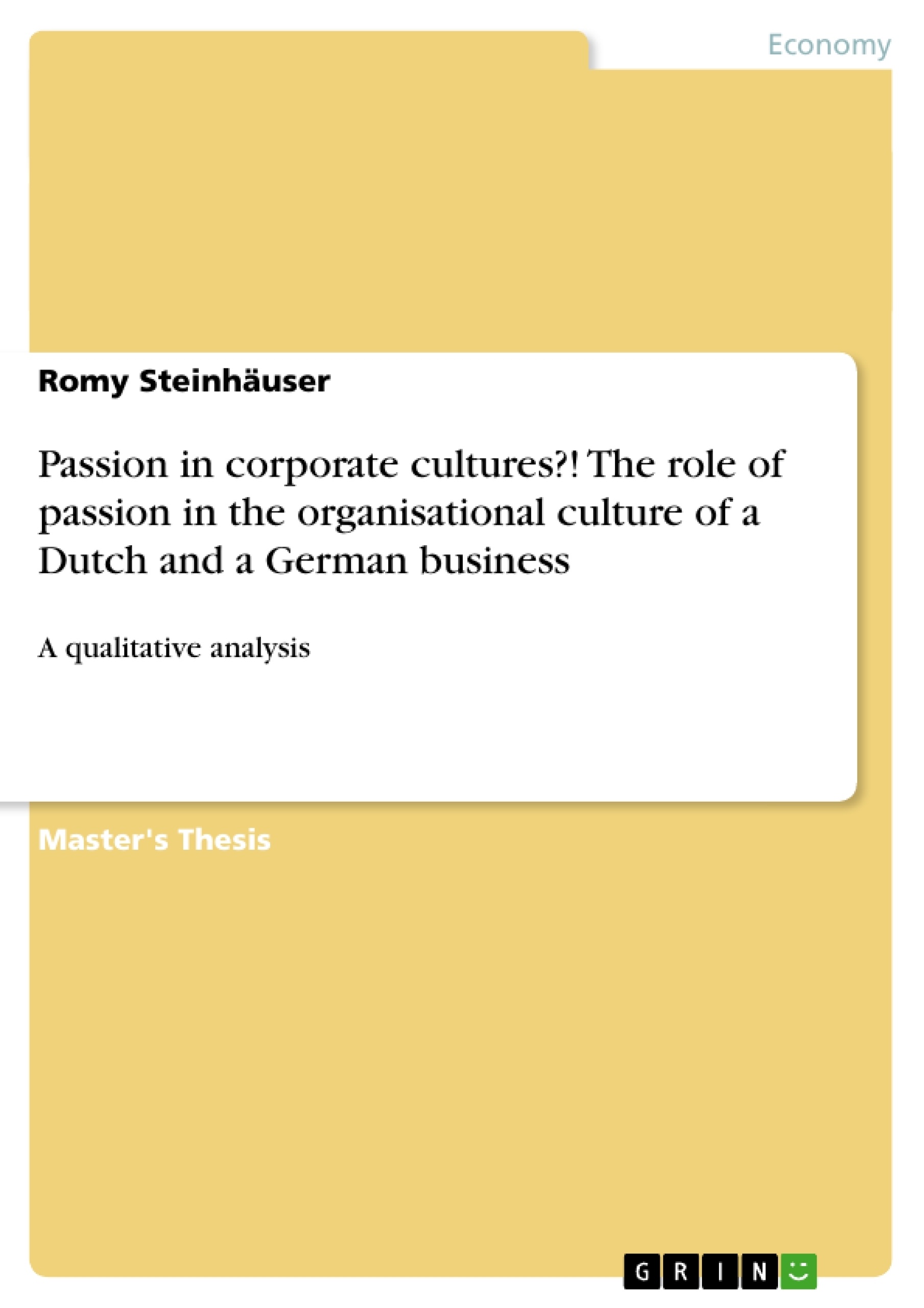The concept of passion is not particularly well researched but has become a hot topic in the academic world in recent years. For, passion offers insight into how people relate to various aspects of their work.
The present study aimed to gain a more research-based understanding of the underpinning elements of the concept of passion. By connecting it with theory on corporate cultures it could be investigated how the concept translates in organisational settings as well as which factors actively contribute to its existence and which may hinder it.
Also, a new framework was developed, which was based on the notion that human beings are four-dimensional. It argued corporate cultures could be seen as four-dimensional.
To test and explore the questions and findings raised in the literature review, a case study research design was chosen. It employed multiple, exploratory research methods such as a so-called preparatory booklet,
interviewing, and observations. Overall, two organisations agreed to participate in the study: a Dutch HRD Consultancy firm and a German four-star superior hotel.
The study found that passion does not only have a spiritual origin but also that it is commonly triggered through an external event or person. Moreover, it has three distinguishable phases that generate both positive and negative effects. They are influenced by various internal and external factors. Likewise, a new type of passion was found that was referred to as ‘corporate passion’. This underlies similar principles as the individual-based concept but is determined differently and thus has different effects. Finally, various factors were established that either supported or inhibited peoples’ passion.
The findings indicate passion is a greatly underestimated concept that does not only generate effects on a personal level but also in organisations as well as beyond (e.g. at clients, with guests). Therefore, it should no
longer be asked whether passion is an incorporated element in corporate cultures but how it can be translated into daily practice.
Inhaltsverzeichnis (Table of Contents)
- Introduction
- Background and relevance of the study
- Central research themes
- Central research questions
- Central research aims
- Contribution of the study
- Further structure and content of the study
- Passion in corporate cultures?! - Answers from literature
- Investigating the concept of passion
- In search for the elements of passion
- Alternative ways to look at passion
- The concept of passion - Implications of the findings for this research
- Examining the concept of (passionate) corporate cultures
- The four energy zones model (Bruch & Ghoshal, 2003)
- The Gods of management classification (Handy, 1995)
- Confucianism or the theory of the Ren and the Li - Part II (Weymes, 2005)
- The concept of (passionate) corporate cultures – Implications of the findings for this study
- A new way of combining the concepts of passion and corporate culture
- The first dimension - Body
- The second dimension – Mind
- The third dimension - Soul
- The fourth dimension - Spirit
- A model of the four-dimensionality of passionate corporate cultures
- The 4D model of passionate corporate cultures - Implications of the findings for this research
- Summary of the literature review
- Research Design
- Phenomenology
- The cases
- Selection criteria
- Description of the organisations
- The methods
- Preparatory booklets
- Semi-structured interviews
- Observations
- The data collection
- The data collection process at K&S
- The data collection process at Hotel Bristol
- The data analysis
- Phase 1: Reducing the data and making them anonymous
- Phase 2: Arranging and assembling the data
- Phase 3: Establishing and identifying key themes and patterns
- Limitations during the research process
- Summary of the research design
- Results
- Interview and observation results
- Main findings at Kessels & Smit
- Interim summary of the main findings at Kessels &Smit
- Main findings at Hotel Bristol
- Interim summary of the results at Hotel Bristol
- Further findings regarding the concept of passion and corporate cultures
- The elements of the concept of passion
- The elements of corporate cultures and the links to passion
- Summary of the results chapter
- Discussion & Conclusion
- Discussion of the conclusions from the analysis process
- Answers to the question: 'What is the concept of passion?'
- Recommendations regarding the concept of passion
- Answers to the question: 'To what does the concept of passion relate in corporate cultures?'
- Recommendations regarding the concept of corporate passion
- Answers to the question: 'What factors nurture/ inhibit passion in corporate cultures?'
- Recommendations regarding support factors and inhibitors of passion
- Critical review of the research process and learning experiences
- Overall summary and conclusions
- Citar trabajo
- Romy Steinhäuser (Autor), 2006, Passion in corporate cultures?! The role of passion in the organisational culture of a Dutch and a German business, Múnich, GRIN Verlag, https://www.grin.com/document/212589



